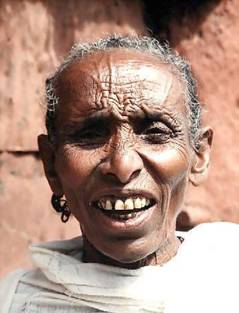|
|
Response to Devastating Drought in Ethiopia
By Angela Stene, International Medical Corps (IMC)
Ethiopia
March 3, 2006

In response to the drought in Ethiopia's Somali and Borena regions, IMC has mobilized its resources in the area to help nearly one million affected people.
IMC is addressing critical nutritional needs of those with the most to lose - children, pregnant mothers and the elderly, through out-patient therapy sites, supplemental feeding and preventative health education. Since arriving in Ethiopia in 2003, IMC has provided therapeutic feeding to populations facing upsurges in chronic malnutrition due to drought and unpredictable harvests.
IMC's emergency food assistance has come a long way in the past three years. Recognizing problems with the conventional models of therapeutic feeding, which involved foreign doctors and foods that required cooking, IMC implemented the community based therapy model, which brings life-saving nutritional therapy to rural communities that often have never seen a doctor or health professional. Because IMC has successfully implemented the community-based model in other food insecure areas, we have been able to respond quickly to the drought in the Somali region, which has resulted in extreme water shortages, fateful food shortages and temperatures over 104 degrees.
IMC and Ethiopia's Ministry of Health operate out of basic health outposts that can be accessed on foot by the thousands of rural households suffering from malnutrition. Though these health posts, created by the Ethiopian government, often had no water access and were starkly equipped with one chair and table, IMC successfully trained Ethiopian government health workers to rehabilitate them and they are now active recovery centers. In these new centers, an average of 90% of severely malnourished children admitted to the program were fully treated and discharged after returning to a normal weight. This program is targeted to children under five years old who would otherwise die from malnourishment, which also threatens to delay critical child development.
The drought also impacts communities that raise livestock and are accustomed to migrating to water sources and grazing areas.
Populations are constantly moving because they are unable to find the resources necessary to survive, so IMC must employ roving teams of nutritionists to follow them. IMC operates out of vehicles equipped with vital therapeutic foods, Vitamin A supplements and medicines to treat respiratory illnesses. As people are constantly moving, it is difficult to monitor and follow up with children's progress. IMC nutritionists rely on the local population to help identify those in need.
Ethiopia loses nearly half a million children under the age of five due to preventable diseases including malaria, measles, neonatal deaths, pneumonia and diarrhea. In over half of these deaths, malnutrition is an underlying factor. IMC treats over 500 severely malnourished children each month using the community based, out-patient model. This allows children in rural areas to receive care that is otherwise inaccessible. IMC also trains parents in essential health education to stave off diseases that affect vulnerable families without cash or food savings.
Though IMC's outpatient therapy programs see terrific results, they are limited in the number of people they can treat. Currently the program is geared toward children under five: those with the most to lose from critical delays in cognitive and physical development, as well as pregnant and lactating mothers. While IMC also provides supplemental feeding or dried food to households, the programs do not reach all who need them.
IMC prides itself on low operational costs: 99% of IMC's staff in Ethiopia is from the country and relationships and collaboration with the Ministry of Health translate into nutritional therapy programs that long outlast IMC's presence in the region. This model frees us up to quickly respond to new disasters through quick mobilization, with minimal start-up costs. But until investment in long-lasting, agricultural development solutions to the chronic food security situation in Ethiopia are made, organizations like IMC will have to continue to rely on ways to somehow identify those with the most to lose, to ensure the little extra assistance to make it through to the next day.
|
|



